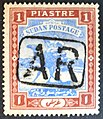Avis de réception



Avis de réception (English: advice or acknowledgment of receipt) is a postal service returning to the sender a form or card signed by the recipient.[1][2] This is evidence that the letter was received, and these forms (or cards) are frequently seen with legal endorsements. It had existed under various names in some postal entities as early as the late 18th century, and was adopted by the GPU General Postal Union in 1875, and again by its successor, the UPU Universal Postal Union in 1879.
Equivalent terms include aviso de recibo, acknowledgment of receipt (Canada), advice of receipt, advice of delivery (UK and much of the Commonwealth), return receipt requested/required/wanted/demanded (US), Rückschein (Germany), ricevuta di ritorno (Italy), zwrotne potwierdzenie odbioru (Poland), aviso de recepción (Salvador 1897 stamps),[3] and many others. The term accusé de réception is sometimes seen, although it is inaccurate. The standard abbreviations are AR and AD.
Collecting
While obscure in some countries (such as Canada, Great Britain, and Australia), AR has always been very popular in others, including India, France and its territories, and especially the United States. There is a great deal of postal history material associated with the AR service: postmarks, AR forms & cards, AR covers, AR covering envelopes for returning AR forms (in use until the early to middle 1920s), rates, and practices. The service is still offered by many national post offices and postal stationery continues to be issued in connection with it.[4]
Gallery
-
An AR mark on a stamp of Sudan.
-
An AR stamp of Chile, 1894.
-
An AR stamp of Montenegro, 1895.
-
An AR stamp of Bolivar, 1903
-
An AR stamp of Panama, 1904.
-
Modern AR stationery of La Poste, France.
See also
- Proof of delivery
- Return receipt, email equivalent
References
- ^ Challenge of acknowledgment of receipt stamps is use on cover by Janet Klug, linns.com, 13 May 2013. Retrieved 6 October 2013. Archived here.
- ^ Described in the Convention for exchange of postal parcels of the International Postal Union, reprinted in Parcel post in foreign countries Washington: Government Printing Office, 1912, p. 309.
- ^ Patrick, Douglas & Mary. The Hodder Stamp Dictionary. London: Hodder & Stoughton, 1973, p. 16. ISBN 0340171839
- ^ "Registration Stamps, but not as we Know Them! Malaysia's 'PosDAFTAR' Registration System" by Len Stanway in Gibbons Stamp Monthly, Vol. 44, No. 5, October 2013, pp. 132-135.
Further reading
- Handelman, David. (2002) AR—avis de réception. Ottawa: Postal History Society of Canada. According to Handelman six postal entities have issued stamps intended to pay the AR fee.






